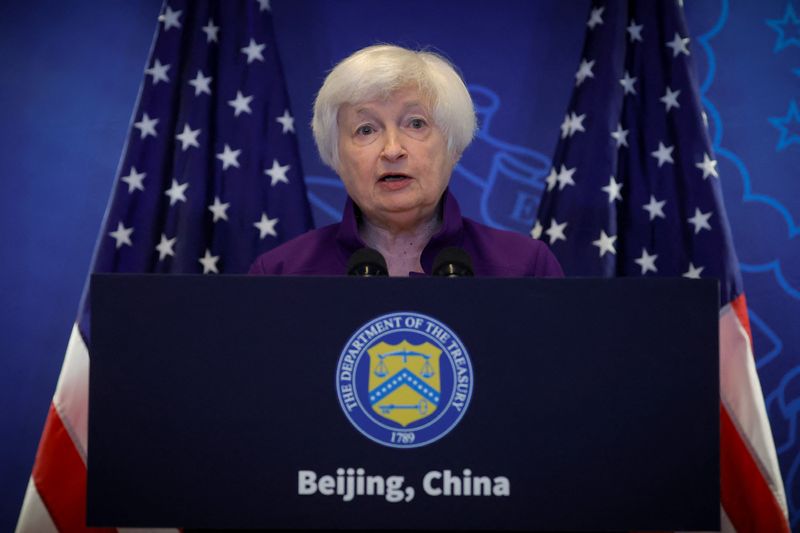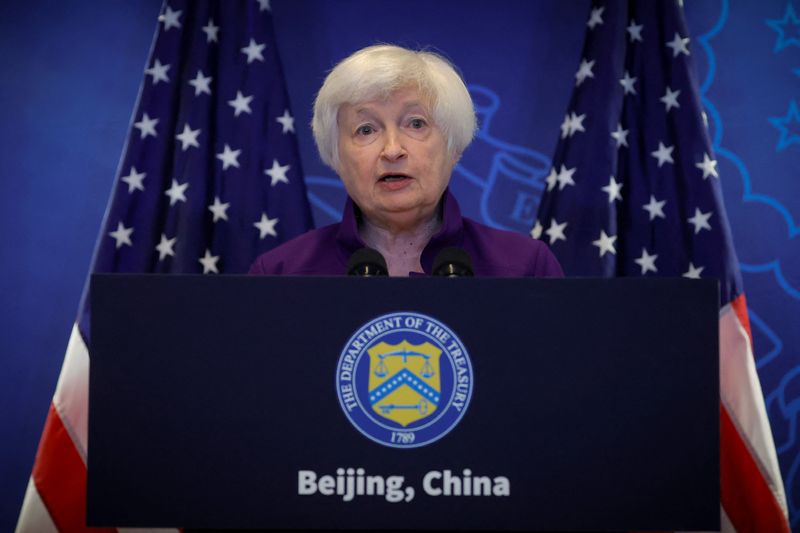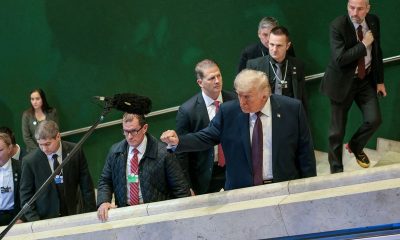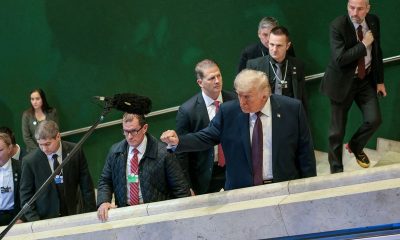Economy
Yellen sees ‘progress’ in rocky US-China ties, expects more communication


© Reuters. U.S. Treasury Secretary Janet Yellen speaks during a press conference at the U.S. embassy in Beijing, China, July 9, 2023. REUTERS/Thomas Peter
By Andrea Shalal
BEIJING (Reuters) -U.S. Treasury Secretary Janet Yellen said 10 hours of meetings with senior Chinese officials in recent days were “direct” and “productive”, helping stabilise the superpowers’ often rocky relationship as her four-day Beijing trip ended.
Before departing China on Sunday, Yellen said the United States and China remained at odds on a number of issues but expressed confidence that her visit had advanced efforts to put the relationship on “surer footing”.
“The U.S. and China have significant disagreements,” Yellen told a press conference at the U.S. embassy in Beijing, citing Washington’s concerns about what she called “unfair economic practices” and recent punitive actions against U.S. firms.
“But President (Joe) Biden and I do not see the relationship between the U.S. and China through the frame of great power conflict. We believe that the world is big enough for both of our countries to thrive.”
With U.S.-China relations at a low over national security issues, including Taiwan, U.S. export bans on advanced technologies and China’s state-led industrial policies, Washington has been trying to repair ties between the world’s two biggest economies.
Secretary of State Antony Blinken visited Beijing last month, the first trip by the top U.S. diplomat in Biden’s presidency. Climate envoy John Kerry is expected to visit this month.
The U.S. diplomatic push comes ahead of a possible meeting between Biden and President Xi Jinping at September’s Group of 20 summit in New Delhi or a Asia-Pacific Economic Cooperation gathering scheduled for November in San Francisco.
Yellen said her visit aimed to establish and deepen ties with China’s new economic team, reduce the risk of misunderstanding and pave the way for cooperation in areas such as climate change and debt distress.
“I do think we’ve made some progress and I think we can have a healthy economic relationship that benefits both of us and the world,” she said, adding that she expected increased and more regular communications at the staff level.
Briefing reporters after the visit, a senior Treasury official said the trip as expected did not result in specific policy breakthroughs, but was “very successful” in terms of “re-establishing contact” and building relationships.
She said Chinese officials raised concerns about an expected U.S. executive order restricting outbound investment, but she assured them any such measure would be narrow in scope and enacted in a transparent way, through a rule-making process that would allow public input.
Yellen said she told Chinese officials they could raise concerns about U.S. actions, so that Washington could explain, and “possibly in some situations, respond to unintended consequences of our actions if they’re not carefully targeted.”
DECOUPLING WOULD BE ‘DISASTROUS’
Yellen met with officials including Premier Li Qiang and People’s Bank of China Deputy Governor Pan Gongsheng, whom she referred to as the head of the central bank, appearing to confirm his expected promotion.
She also met U.S. companies doing business in China, climate finance experts and women economists.
In her meetings with officials, she urged more cooperation between the sides on economic and climate issues while criticising what she called “punitive actions” against U.S. companies in China.
She reiterated that Washington was not seeking to decouple from China’s economy, as doing so would be “disastrous for both countries and destabilising for the world.”
The U.S. has implemented export controls designed to restrict China’s ability to acquire high-tech microchips that Washington fears could have military applications, and is considering an executive order to curb U.S. investment in sensitive areas.
But some U.S. lawmakers want stronger action. A bipartisan group has proposed giving the government sweeping powers to block billions in U.S. investment into China.
Yellen said she had emphasised to her Chinese counterparts that any investment curbs would be “highly targeted, and clearly directed, narrowly, at a few sectors where we have specific national security concerns,” to avoid unnecessary repercussions”.
Yellen stressed that any executive order would not be for economic gain and talked through what such an order “might look like” with her Chinese counterparts, according to the senior treasury official.
Asked about plans by Brazil, Russia, India, China and South Africa to create a common trading currency for their BRICS group, Yellen said she expected the dollar to remain the dominant currency in international transactions.
On Russia’s war in Ukraine, she told her Chinese interlocutors it was “essential” that Chinese firms avoid providing Moscow with material support for the war or in evading sanctions.
Economy
Russian central bank says it needs months to make sure CPI falling before rate cuts -RBC


© Reuters. Russian Central Bank Governor Elvira Nabiullina attends a news conference in Moscow, Russia June 14, 2019. REUTERS/Shamil Zhumatov/File Photo
MOSCOW (Reuters) – Russia’s central bank will need two to three months to make sure that inflation is steadily declining before taking any decision on interest rate cuts, the bank’s governor Elvira Nabiullina told RBC media on Sunday.
The central bank raised its key interest rate by 100 basis points to 16% earlier in December, hiking for the fifth consecutive meeting in response to stubborn inflation, and suggested that its tightening cycle was nearly over.
Nabiullina said it was not yet clear when exactly the regulator would start cutting rates, however.
“We really need to make sure that inflation is steadily decreasing, that these are not one-off factors that can affect the rate of price growth in a particular month,” she said.
Nabiullina said the bank was taking into account a wide range of indicators but primarily those that “characterize the stability of inflation”.
“This will take two or three months or more – it depends on how much the wide range of indicators that characterize sustainable inflation declines,” she said.
The bank will next convene to set its benchmark rate on Feb. 16.
The governor also said the bank should have started monetary policy tightening earlier than in July, when it embarked on the rate-hiking cycle.
Economy
China identifies second set of projects in $140 billion spending plan


© Reuters. FILE PHOTO: Workers walk past an under-construction area with completed office towers in the background, in Shenzhen’s Qianhai new district, Guangdong province, China August 25, 2023. REUTERS/David Kirton/File Photo
SHANGHAI (Reuters) – China’s top planning body said on Saturday it had identified a second batch of public investment projects, including flood control and disaster relief programmes, under a bond issuance and investment plan announced in October to boost the economy.
With the latest tranche, China has now earmarked more than 800 billion yuan of its 1 trillion yuan ($140 billion) in additional government bond issuance in the fourth quarter, as it focuses on fiscal steps to shore up the flagging economy.
The National Development and Reform Commission (NDRC) said in a statement on Saturday it had identified 9,600 projects with planned investment of more than 560 billion yuan.
China’s economy, the world’s second largest, is struggling to regain its footing post-COVID-19 as policymakers grapple with tepid consumer demand, weak exports, falling foreign investment and a deepening real estate crisis.
The 1 trillion yuan in additional bond issuance will widen China’s 2023 budget deficit ratio to around 3.8 percent from 3 percent, the state-run Xinhua news agency has said.
“Construction of the projects will improve China’s flood control system, emergency response mechanism and disaster relief capabilities, and better protect people’s lives and property, so it is very significant,” the NDRC said.
The agency said it will coordinate with other government bodies to make sure that funds are allocated speedily for investment and that high standards of quality are maintained in project construction.
($1 = 7.1315 renminbi)
Economy
Russian central bank says it needs months to make sure CPI falling before rate cuts -RBC


© Reuters. Russian Central Bank Governor Elvira Nabiullina attends a news conference in Moscow, Russia June 14, 2019. REUTERS/Shamil Zhumatov/File Photo
MOSCOW (Reuters) – Russia’s central bank will need two to three months to make sure that inflation is steadily declining before taking any decision on interest rate cuts, the bank’s governor Elvira Nabiullina told RBC media on Sunday.
The central bank raised its key interest rate by 100 basis points to 16% earlier in December, hiking for the fifth consecutive meeting in response to stubborn inflation, and suggested that its tightening cycle was nearly over.
Nabiullina said it was not yet clear when exactly the regulator would start cutting rates, however.
“We really need to make sure that inflation is steadily decreasing, that these are not one-off factors that can affect the rate of price growth in a particular month,” she said.
Nabiullina said the bank was taking into account a wide range of indicators but primarily those that “characterize the stability of inflation”.
“This will take two or three months or more – it depends on how much the wide range of indicators that characterize sustainable inflation declines,” she said.
The bank will next convene to set its benchmark rate on Feb. 16.
The governor also said the bank should have started monetary policy tightening earlier than in July, when it embarked on the rate-hiking cycle.

 Forex4 years ago
Forex4 years agoForex Today: the dollar is gaining strength amid gloomy sentiment at the start of the Fed’s week

 Forex3 years ago
Forex3 years agoUnbiased review of Pocket Option broker

 Forex3 years ago
Forex3 years agoDollar to pound sterling exchange rate today: Pound plummeted to its lowest since 1985

 Forex3 years ago
Forex3 years agoHow is the Australian dollar doing today?

 Cryptocurrency3 years ago
Cryptocurrency3 years agoWhat happened in the crypto market – current events today

 World3 years ago
World3 years agoWhy are modern video games an art form?

 Commodities3 years ago
Commodities3 years agoCopper continues to fall in price on expectations of lower demand in China

 Economy3 years ago
Economy3 years agoCrude oil tankers double in price due to EU anti-Russian sanctions

























